Workshops

The Electronics and Mechanical workshops provide an important central facility for the LMB.
As well as providing instrument improvements, modifications and repairs, the workshops are responsible for designing and constructing a wide range of complex scientific instruments that are not available commercially.
By having the workshops on site, work to design, prototype and develop new instruments happens much faster at the LMB than in other laboratories, which are reliant on outside contractors.
The work of the LMB’s workshop experts has also had a wider impact on research – in the UK and worldwide. Over the years the LMB’s workshop staff have created a number of novel instruments which have been adopted by the wider scientific community including some that have gone on to be produced commercially.
Electronics Workshop
The Electronics Workshop has been a key factor in the development of new techniques and instrumentation at the LMB since the 1960s. Originally set up to provide expertise in X-ray crystallography, the workshop has capitalised on the rapid changes in electronics over the years, developing a wide range of abilities to support the requirements of the LMB’s scientists – resulting in what is probably the most capable workshop to be found in any UK biology laboratory.
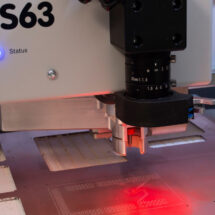 The engineers’ skills encompass the full range of current electronic techniques, including programmable logic, computer interfacing, embedded systems, laser controllers and wireless data acquisition, plus software in a variety of languages. Also, a full range of CAD tools enable the manufacture of printed circuit boards in-house.
The engineers’ skills encompass the full range of current electronic techniques, including programmable logic, computer interfacing, embedded systems, laser controllers and wireless data acquisition, plus software in a variety of languages. Also, a full range of CAD tools enable the manufacture of printed circuit boards in-house.
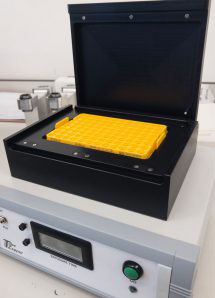 The workshop can adapt existing equipment or design and construct complete systems from scratch. Examples of the many hundreds of projects undertaken over the years include a photomultiplier system for long-term monitoring of circadian gene expression in cells and tissues, optical and control systems for confocal microscopy, and a complete custom robotic system for high-throughput genomics. Others include thermal imaging systems for monitoring animal behavioural activity, advanced sensors for integration into microfluidic chips, and a miniature thermal stage for micro-scale PCR. Recent developments in all types of optogenetic techniques, along with changes in microscope illumination, have also led to a significant increase in expertise in the use of high-power LEDs and laser systems.
The workshop can adapt existing equipment or design and construct complete systems from scratch. Examples of the many hundreds of projects undertaken over the years include a photomultiplier system for long-term monitoring of circadian gene expression in cells and tissues, optical and control systems for confocal microscopy, and a complete custom robotic system for high-throughput genomics. Others include thermal imaging systems for monitoring animal behavioural activity, advanced sensors for integration into microfluidic chips, and a miniature thermal stage for micro-scale PCR. Recent developments in all types of optogenetic techniques, along with changes in microscope illumination, have also led to a significant increase in expertise in the use of high-power LEDs and laser systems.
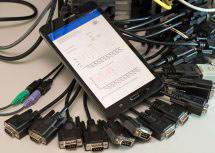 Custom software, particularly for instrument control and interfacing, can be developed for Windows, Mac OS, Linux and Android.
Custom software, particularly for instrument control and interfacing, can be developed for Windows, Mac OS, Linux and Android.
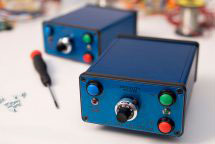 Many projects are undertaken in partnership with the Mechanical Workshop. Like all of the LMB’s resources, the Electronics Workshop is there to serve the researchers, and its skills are at the disposal of all members of the Laboratory from PhD students to group heads. The Workshop’s staff are always ready to discuss new projects, helping to develop an initial idea into a fully-functional piece of equipment.
Many projects are undertaken in partnership with the Mechanical Workshop. Like all of the LMB’s resources, the Electronics Workshop is there to serve the researchers, and its skills are at the disposal of all members of the Laboratory from PhD students to group heads. The Workshop’s staff are always ready to discuss new projects, helping to develop an initial idea into a fully-functional piece of equipment.
Andy Howe is the head of the Electronics Workshop.
Mechanical Workshop
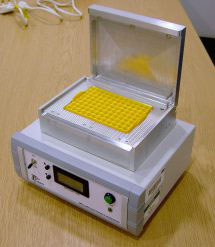 The Mechanical Workshop was originally set up to design and build the X-ray generators and detectors for crystallographic studies. Today, it is one of the most sophisticated engineering departments in the biological sciences, and undertakes a huge range of work.
The Mechanical Workshop was originally set up to design and build the X-ray generators and detectors for crystallographic studies. Today, it is one of the most sophisticated engineering departments in the biological sciences, and undertakes a huge range of work.
Extensive use is made of computer-aided design and computer-aided manufacture (CAD-CAM) which, combined with the experience of the Workshop’s staff, and their ability to work with any material − from Teflon to titanium − means that almost any challenge can be met, from a new electron microscope stage to a microtome for taking ultra-thin brain sections.
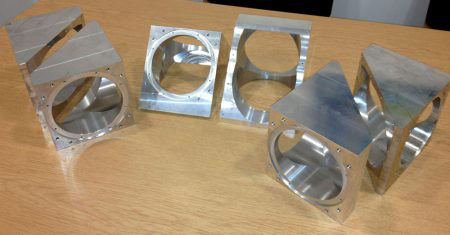 The high standard of the Mechanical Workshop’s design and engineering, coupled with the challenges set by the Laboratory’s scientists, has led to the commercial development of many projects started at the LMB. Indeed, many of the items now found in labs around the world, from gel tanks to confocal microscopes, have started life in the LMB workshops.
The high standard of the Mechanical Workshop’s design and engineering, coupled with the challenges set by the Laboratory’s scientists, has led to the commercial development of many projects started at the LMB. Indeed, many of the items now found in labs around the world, from gel tanks to confocal microscopes, have started life in the LMB workshops.
Repairs and quick ‘day job’ projects are undertaken on demand to ensure the smooth running of the Laboratory and a speedy service to the scientists. Technical advice and project feasibility discussion is always available and visitors to the Workshop are welcome.
Adam Fowle is the head of the Mechanical Workshop.